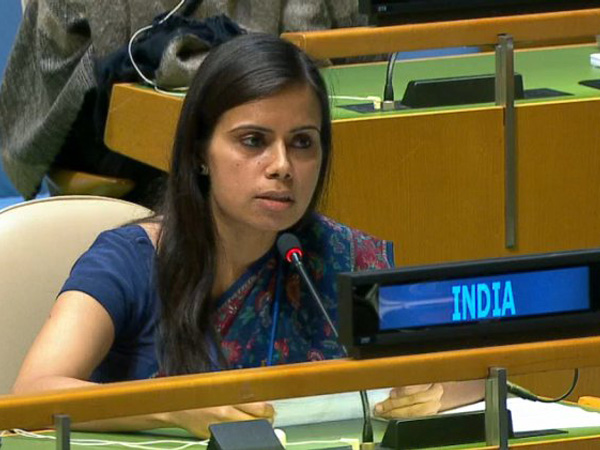Pakistan is now 'terroristan': India tells United Nations
Pakistan has now become 'terroristan', India told the United Nations in response to its Prime Minister Shahid Khaqan Abbasi's emphasis that Islamabad was not prepared to be anyone's scapegoat.

New York: Pakistan has now become 'terroristan', India told the United Nations in response to its Prime Minister Shahid Khaqan Abbasi's emphasis that Islamabad was not prepared to be anyone's scapegoat.
"In its short history, Pakistan has become a geography synonymous with terror. The quest for a land of pure has actually produced the land of pure terror. Pakistan is now Terroristan," India said, in a statement addressed to the United Nations general assembly president.
In his first remarks to the U.N. general assembly, Abbasi had attacked India, accusing New Delhi of carrying out war crimes in Kashmir.
"Pakistan demands an international investigation into India's crimes in Kashmir," he said and demanded an inquiry Commission be sent to Kashmir "to verify the nature and extent of India's human rights violations, secure the punishment of those responsible and provide justice and relief to the victims."
"It is extraordinary that the state which protected Osama Bin Laden and sheltered Mullah Omar should have the gumption to play victim. Even as terrorists thrive in Pakistan and roam around its streets with impunity, we have heard it lecture about protection of human rights in India. The world does not need lessons on democracy and human rights from a country whose own situation is charitably described as a failed state," India led a retaliatory attack on Pakistan.
Also Read: UN Security Council exhorts North Korea to denuclearize
"Pakistan must understand that the state of Jammu and Kashmir is and will always remain an integral part of India. However much it scales up the cross border terrorism, it will never succeed in undermining India's territorial integrity," India's statement added.
Also Read |
UN evades question on Kulbhushan Jadhav's death sentence
The Pakistan prime minister had also added that India was not willing to resume dialogue to resolve the dispute.
"To this end, the UN Secretary-General should appoint a Special Envoy on Kashmir," he said.
During his address, Abbasi further said Pakistan has been consistently active in the war against terrorism and that it has lost more to the cause than any other nation.
Speaking about the issue of terrorism and the Afghan conflict, the premier said that Pakistan had sacrificed a lot of lives in the war on terror, and nobody desired peace in Afghanistan more than Pakistan.
"Our counter-terrorism credentials cannot be questioned. We have lost 2,700 lives and sustained 50,000 injuries in this war," he said.
"From sixteen years of the ongoing war in Afghanistan, it is clear that peace could not be restored by the continuing resort to military force. Neither Kabul and the coalition nor the Afghan Taliban can impose military solution on each other."
Also Read: UN to North Korea: Return to path of denuclearization
Also Read |
Opening of Kartarpur Corridor practical proof of Pakistan's desire for peace, says UN chief
"Apart from Afghanistan, Pakistan and its people have suffered the most from four decades of foreign intervention and civil wars in Afghanistan," he added.
During his 20-minute speech, Abbasi stated that Taliban safe havens are located not in Pakistan but in large tracts of territory controlled by the Taliban in Afghanistan.
The Pakistan Prime Minister also maintained that Islamabad was not prepared to fight the Afghan war on Pakistan's soil.
"Neither can we endorse any fair strategy that prolongs and intensify the sufferings of the people of Afghanistan and Pakistan," he said.
He also identified two flaws in the global counter-terror strategy. One of this, Abbasi remarked, was state-sponsored terrorism, and the failure of the UN to reign in states that use this as an instrument of their foreign policy. (ANI)
 Dynamite News
Dynamite News 